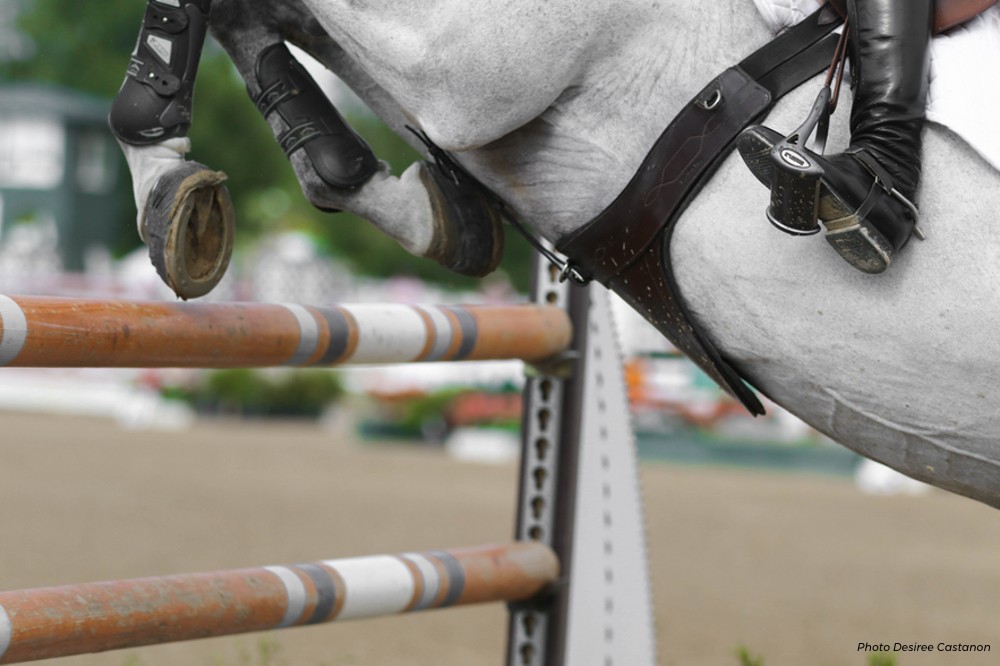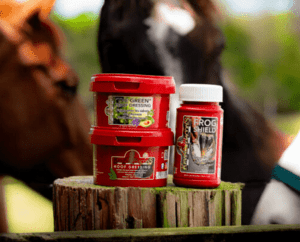The Blood Rule and A Flood of Controversy

At the Olympic Games in Rio, four show jumpers were eliminated from individual competition when a ground jury found that riders drew blood on their horses with the whip or spurs. Despite this, they were allowed to continue in team events.
In 2010, a top dressage rider was eliminated during a Grand Prix test at the World Equestrian Games when a judge spotted blood in the horse’s mouth. The rider and horse pair were not allowed to continue to the Grand Prix Special or Freestyle after the elimination.
At the Fair Hill International Horse Trials in 2016, a top level eventer was allowed to continue on cross country after the ground jury identified blood in the horse’s mouth more than halfway through the course. The horse was deemed fit to continue to stadium jumping by a veterinarian and the rider wasn’t eliminated or given a warning.
The laws related to blood on a horse may vary between show jumping, dressage, eventing and hunter disciplines, but the the intention is the same: to safeguard the welfare of the horse. But top riders and trainers are at odd ends on how the rule should be enforced. One camp believes each incident should be dealt with on a case-by-case basis. Others say there’s no room for tolerance in any sense.
“It is only seen as controversial as the rider is usually upset that he or she has been disqualified and something out of their control has led to elimination. The rule in dressage and jumping is currently unambiguous and therefore does not allow any element of common sense or flexibility,” said Dr. Peter Milligan, a team veterinarian with British Eventing. “However, the more ‘grey’ a rule is then there is the opportunity for appeals and arguments. I have sympathy for cases where horses have bitten their tongue or lip in dressage, but spur marks in jumping should and could be avoided.”
But that doesn’t stop any elimination by this rule from being controversial. The presence of blood on a horse does not necessarily indicate that abuse has taken place, but as the rules currently stand, there’s no division between whether the horse accidentally nicked its lip or a rider has beaten the horse with a whip to excess.
“I had a student who took care of her own equipment and didn’t realize her horse had chewed the bit to a razor-sharp edge,” recalls Mary Babick, president of the U.S. Hunter Jumper Association. “The horse bled from its mouth and she was eliminated for the rest of the day. Of course she was upset that she couldn’t show, but she was more ashamed that she hurt her horse.”
The rules are in place to stop abuse and therefore should be taken seriously, Babick reinforced, even if that means some embarrassment and an unfortunate elimination.
“Punishing those who fail to respect the welfare of a horse is certainly right, however a norm cannot deal out summary justice.” – IJRC
Leaders with the International Dressage Riders Club have been vocal on this subject for years. Their stance is strong: if a horse has blood in the mouth, it should be eliminated.
“The FEI rule (in dressage) is strict because it’s set up for the best interest of the horse,” said Lee Tubman, a Canadian Grand Prix dressage rider and FEI judge based in Wellington, Fla. “While we can’t say the instances that lead to a blood rule elimination are definitive, there is no alternative. The default is to protect the horse. That’s why there’s no room for discussion.”
But the International Jumping Riders Club is pushing for a change in mindset when it comes to the blood rule in show jumping. The group says that stewards and delegates at sanctioned events should be able to rely on their own discretion and consider all the circumstances in an individual case when considering an elimination on a horse that may be bleeding.
“Punishing those who fail to respect the welfare of a horse is certainly right, however a norm cannot deal out summary justice. General principles of legal rights must be respected in every case,” wrote an IJRC spokesman. “Our proposal would have the effect of presuming the riders’ innocence in the FEI court.”
If a rider is eliminated from competition because of blood on the horse, they can appeal the decision to FEI officials.
While the rules may vary, the FEI enforcement is much the same across disciplines. Ground juries, technical delegates and veterinary delegates are the ones who monitor and enforce the rules, which often leads to warnings, veterinary reviews, or disqualifications. The rules are being “constantly reviewed” by the FEI’s technical committees to keep them relevant but stay true to their intention, which is to eliminate any abuse to the horse, said FEI spokeswoman Ruth Grundy.
“Inappropriate use of spurs in jumping is disturbing,” Babick said. She explained that there’s been an uptick in use of new equipment, like saddle pads that run down the the belly near the girth to hide where the spurs would mark their body. “I have a real problem when a rider isn’t taught to ride correctly, and their leg swings which leads to more spur marks. But a bleeding gouge, I have a real problem with that.”
“The default is to protect the horse. That’s why there’s no room for discussion.” – Lee Tubman
Disqualifications seem to be the most prevalent in the sport of eventing. However, warnings are more common than actual eliminations, according to FEI statistics.
“In eventing, it would not be uncommon to find horses with a small amount of blood in their mouths at the end of cross country if the bit has caused a small rub,” Milligan explained. “Given the nature of eventing with the solid obstacles, it is not uncommon for small injuries to happen. The wording of the rule in eventing allows the ground jury and the veterinary delegate to approach cases on a individual basis to apply common sense.”
Lee says that trainers and riders who focus on riding and training their horses correctly shouldn’t be concerned about an elimination related to blood.
“There is a risk for everyone,” he said. “But if a rider is teaching the horse to travel lightly in the correct self carriage, the probability of something happening to them will be lower.”
Here’s how the rule stands currently, broken down by discipline:
Dressage: [FEI Article 430] If a judge or FEI steward suspects fresh blood anywhere on the horse before, during or after a test, they can stop the horse to check for blood. If the horse shows fresh blood anywhere on the body, it will be eliminated. If no fresh blood is found, the horse and rider can resume or ride the test without penalty. If blood is found after a test is completed, the horse and rider could still be eliminated by the judge. A veterinarian will determine if the horse can continue competing. If a horse is disqualified for blood during the Grand Prix test at the Olympic Games and is competing as an individual, it will not be eligible to go through the Grand Prix Special, even if a veterinarian determines the horse is fit to continue. If competing on a team, the veterinarian can determine the horse is clear to continue.
Eventing: [FEI Article 526.4] Blood on horses may be an indication of abuse of the horse and must be reviewed case-by-case by the ground jury. In minor cases of blood in the mouth, such as where a horse appears to have bitten its tongue or lip, or minor bleeding on limbs, the ground jury may investigate and authorize the athlete to continue.
Show Jumping: [FEI Article 242.3.1] Officials may eliminate a rider and horse pair if a horse is bleeding on the flank(s), in the mouth or nose, or has marks indicating excessive use of spurs or of the whip anywhere on the body. Officials may authorize the rinsing or wiping of the mouth and allow the horse to continue but any further evidence of blood will result in disqualification.
Hunter/Jumper: There is no national rule by the USEF or USHJA that enforces blood on a horse, said Mary Babick, president of the USHJA. However, general welfare rules say a judge or a steward may disqualify a rider and horse pair if they see blood on the animal. It is judged on a case-by-case basis.


